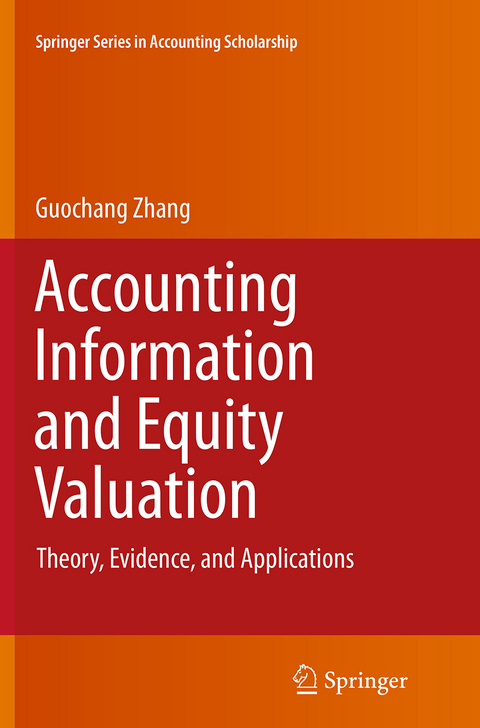
Accounting Information and Equity Valuation
Springer-Verlag New York Inc.
978-1-4939-4344-9 (ISBN)
The purpose of this book is to offer a more systematic and structured treatment of the research on accounting‐based valuation, with a primary focus on recent theoretical developments and the resulting empirical analyses that recognize the role of accounting information in making managerial decisions.
Since its inception, valuation research in accounting has evolved primarily along an “empirically driven” path. In the absence of models constructed specifically to explain this topic, researchers have relied on economic intuition and theories from other disciplines (mainly finance and economics) as a basis for designing empirical analyses and interpreting findings. Although this literature has shed important light on the usefulness of accounting information in capital markets, it is obvious that the lack of a rigorous theoretical framework has hindered the establishment of a systematic and well‐structured literature and made it difficult to probe valuation issues in depth.
More recently, however, progress has been made on the theoretical front. The two most prominent frameworks are (i) the “linear information dynamic approach” and (ii) the “real options‐based approach” which recognizes managerial uses of accounting information in the pursuit of value generation. This volume devotes its initial chapters to an evaluation of the models using the linear dynamic approach, and then provides a synthesis of the theoretical studies that adopt the real options approach and the empirical works which draw on them. The book also makes an attempt to revisit and critique existing empirical research (value-relevance and earnings-response studies) within the real options-based framework. It is hoped that the book can heighten interest in integrating theoretical and empirical research in this field, and play a role in helping this literature develop into a more structured and cohesive body of work.
Value is of ultimate concern to economic decision-makers, and valuation theory should serve as a platform for studying other accounting topics. The book ends with a call for increased links of other areas of accounting research to valuation theory.
Guochang Zhang is Professor of Accounting at the Hong Kong University of Science and Technology (HKUST), where he has taught since 1993; he previously served as Assistant Professor at the University of Waterloo. He received his MSc in Accounting and PhD in Finance at the University of British Columbia. His research specialties include accounting-based valuation (with an emphasis on applications to investor and company decisions and to accounting standard setting), and the quality of accounting standards and the efficiency of the real economy. He has published in such journals as The Accounting Review, Journal of Accounting and Public Policy, Journal of Accounting and Economics, Journal of Accounting Research, and Review of Accounting Studies.
Chapter 1 Value Concept and Accounting Measures of Value Generation: The Residual Income Model.- Chapter 2 Mapping Accounting Data to Value via Linear Information Dynamics: the Early Approach.- Chapter 3 Capital Following Profitability: Why the Residual Income Dynamic is Nonlinear.- Chapter 4 A Basic Model of Equity Value: Incorporating Growth and Abandonment Options.- Chapter 5 Testing the Properties of the ROM.- Chapter 6 Casting Theoretical Light on the Empirical Valuation Literature.- Chapter 7 Valuing Multiple-segment Firms: How Segment-level Data are Incrementally Relevant.- Chapter 8 A Valuation-based Theory of Corporate Divestiture: Why Financial Reporting May Fail to Resolve Information Asymmetries.- Chapter 9 Accounting Information and Equity Returns: A Derivative of the Value Function.- Chapter 10 An Evaluation of the Return-Earnings Research.- Chapter 11 Fair Value Accounting and Income Measurement: An Application to Standard Setting.- Chapter 12 Interpreting Financial Information in an Industry Context.- Chapter 13 Limitations and Future Directions.
| Erscheinungsdatum | 04.10.2016 |
|---|---|
| Reihe/Serie | Springer Series in Accounting Scholarship ; 6 |
| Zusatzinfo | 13 Illustrations, black and white; XXIV, 233 p. 13 illus. |
| Verlagsort | New York |
| Sprache | englisch |
| Maße | 155 x 235 mm |
| Themenwelt | Wirtschaft ► Betriebswirtschaft / Management ► Finanzierung |
| Wirtschaft ► Betriebswirtschaft / Management ► Rechnungswesen / Bilanzen | |
| Schlagworte | accounting information • Book value • Earnings • Equity return • Equity Valuation • Financial Reporting |
| ISBN-10 | 1-4939-4344-8 / 1493943448 |
| ISBN-13 | 978-1-4939-4344-9 / 9781493943449 |
| Zustand | Neuware |
| Informationen gemäß Produktsicherheitsverordnung (GPSR) | |
| Haben Sie eine Frage zum Produkt? |
aus dem Bereich


